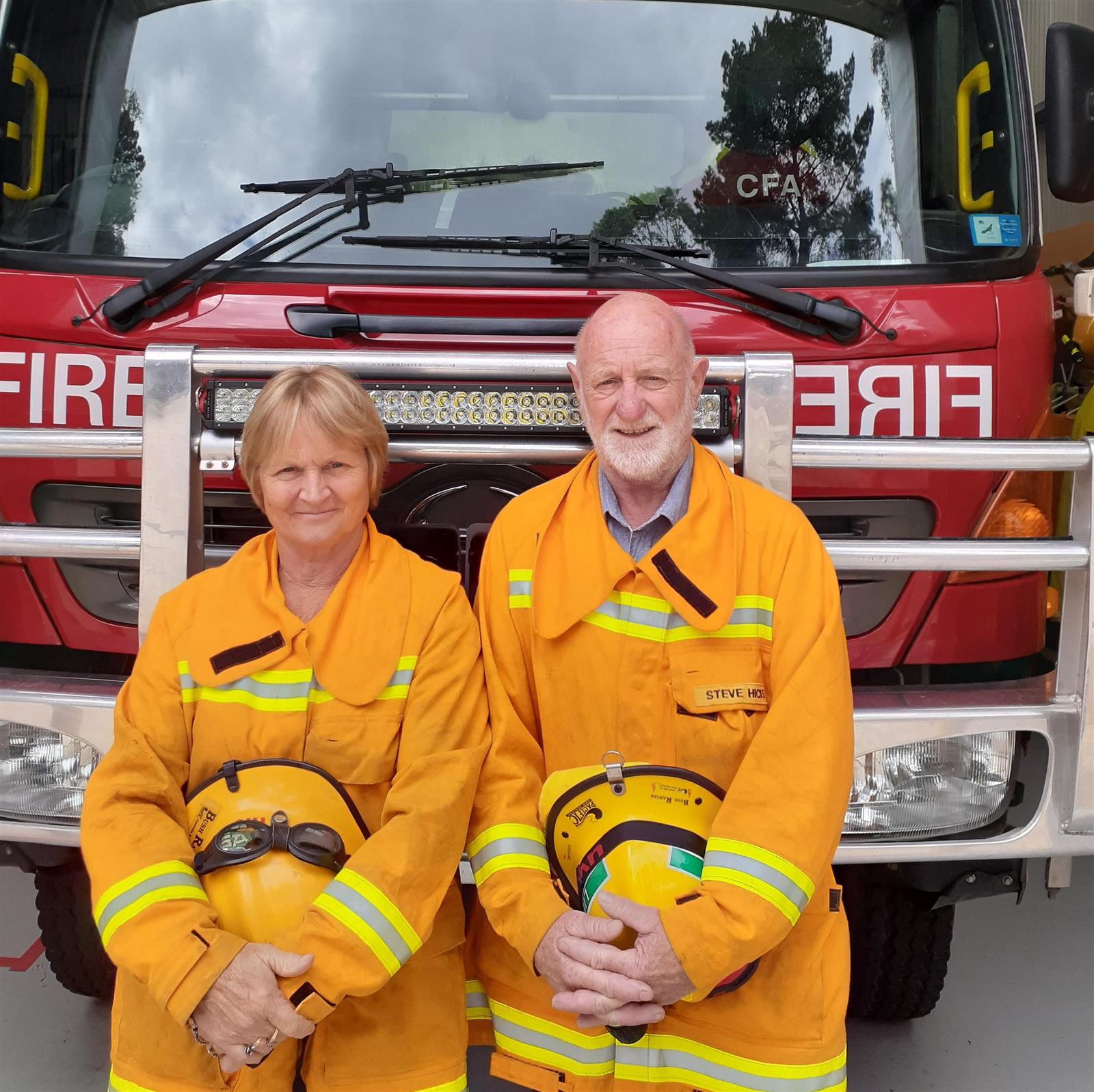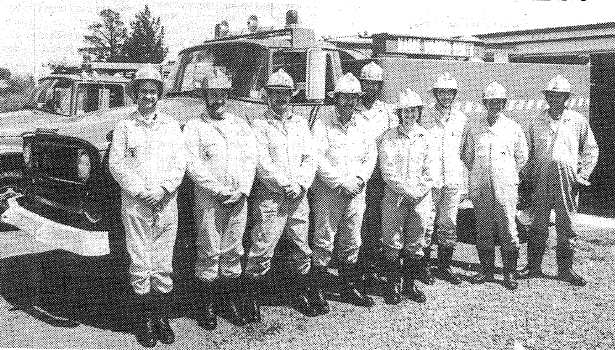
The Ash Wednesday 40th Anniversary Commemorative Event was held at the Ash Wednesday Bushfire Education Centre in Cockatoo on Sunday, 12 February to commemorate a tragic event in Victoria’s bushfire history. Thursday, 16 February marks the 40-year anniversary of Ash Wednesday.
(You can watch the commemorative event on CFA's YouTube channel.)
Lisa and Steve Hicks were Narre Warren North Fire Brigade members at the time and fought the fires gallantly within their region.
For Lisa, it was the case of marrying the boy next door. It all began in November 1975 when Steve introduced himself and invited her to the Narre Warren North Fire Brigade, and now 48 years later, the pair remain active members turning out to any call alongside three of their children in their respective brigades.
“I was riding my horse and this gentleman called me over and said ‘how would you like to go to an all you can eat, all you can drink bonfire night at the Narre Warren Fire Station?’” she said.
“I think I joined the brigade the very next day.
“We bought a home in the same street we both grew up in, right next door to his mum and dad and the rest is history.”
Steve who joined in 1973 when he was 16, was poached by the local captain.
“It was a country sort of town back then and the captain said, ‘What are you guys doing? Why don’t you make yourselves useful and come and join the brigade?’” Steve said.
Married in September 1982, meant Lisa and Steve had only been newlyweds for just five months before they battled the most challenging event they’d come to encounter.
When reflecting on the horrendous conditions they faced on Ash Wednesday, both Steve and Lisa echoed similar feelings in the early hours of the day.
“It started when I first woke up in the morning. I thought this is going to be a bad day,” she said.
“You got used to what type of weather really put you on edge, and it was exactly that. It had an unnerving feeling to it.
“You knew the day before that the next day was going to be ordinary because of the intensifying heat and the extreme wind warnings. It was just a matter of where and when something was going to happen.” he said.
After returning home at around 2pm on Wednesday, 16 February after her gym work shift, Lisa was convinced things weren’t looking good as she drove past the smoke that had started to line the sky.
“As I walked into my home the phone was ringing for a callout to a grassfire at Belgrave South out the back of the primary school,” she said.
“I went straight to the station, and Darrell Wilkes who was a member with us who had just transferred to Narre Warren, called in to get his gear and they picked him up on their way through.
“I wished him well and didn’t realise that was the last time I’d ever see him. That was a bit hard to take.”
Steve who was captain at the time, had just donated blood and heard his old two-tone pager and local fire siren sounding in the distance.
“I walked outside to see if I could see the fire approximately 10km to the north and as I was looking the Narre North tanker was heading past the hall towards Belgrave South with lights and sirens.
“I immediately hopped in my car and headed home to change, have drink of water and head down to the station.
Due to his limitations having just given blood, Steve reluctantly remained at the station dispatching tankers and crews in directions that were changing every 15 to 30 minutes. From Belgrave to Narre Warren North, and all across Harkaway, the fire had a mind of its own and changed at will.
“I dispatched the tanker to areas in Narre Warren East to see if they could stop some of the fire whilst in the grassland or protect any properties in its path,” he said.
“About two hours later, tanker 2 returned with scorch marks around the back of the truck, with very tired and dirty crew members.
“The vapors from the petrol-driven water pump had caught fire whilst driving up Chadwick Road trying to defend houses. Fortunately, the crew was able to put the fire out on the truck before it caused any real damage.
“We worked our way along kilometres of fire edge from Chadwick Road to Harkaway to stop the fire progressing slowly to the west.”
Lisa who was only 23 and Steve, 25 were separated for up to 10 days, as Lisa was on an Austin tanker and Steve on alternating shifts.
“We just went out and did our jobs. It was horrible, it was running so fast you couldn’t even formulate what you were going to do next,” she said.
“You were just trying to look after what you were assigned to but then by the time you got there and sorted yourself out you were sent elsewhere; it just went mad. It was a long, long first day.
“We spent a fair amount of time trying to secure the explosives shed at the Harkaway Quarry,” Steve said.
“As the wind change hit at 8pm you could hear the explosions and see flashes of light on the next ridge line in the distance as the fire entered the Upper Beaconsfield township.”
At one stage, Steve headed to a property he knew could be right in the middle of the fire.
“We took the van with the pump and I knew there was a dam out the back, so I said let’s go up there and see if we can do anything to protect them,” he said.
“Unfortunately, we weren’t able to get primed before the fire hit us and we were down near the dam where they washed out all the kennels. It was absolutely disgusting in there with three-foot grass around it.
“I happened to be right next to it when the fire caught alight, and I considered jumping in. But I looked for shorter grass where it just burned around."
With the radio intermittent because of poor reception in the hills and the harrowing wind, Lisa said they didn’t think too much of it when they heard them call in Narre Warren’s unresponsive entrapped tanker.
“We were all so busy, but then there was this moment when everything stopped. The wind went away and there was this eerie silence, but it wasn’t silent,” she said.
“I remember when we went back to change crews, we were at the top of Abeckett Road and all you could see was everything alight. It was disastrous and we still didn’t know about the crews that were gone.”
“It was right when the wind was at its highest. I can certainly remember it went silent and you just waited and waited, and you heard nothing, so you just went about your own business,” Steve said.
“I had no idea where they were and we didn’t think we were in a position to help them because there weren’t any other trucks around us, so you just hoped like hell that they were all OK.”
“It wasn’t until the next morning we got confirmation. From then on we were just in shock, we went into autopilot,” she said.
“You continued to turn out, and black out and all the time thinking, no it’s not real, it’s not real, it didn’t happen, they’re there, they just haven’t found them yet.
“Then of course the news came through and I was sent out there the next day, so it was really tough.”
The brigade spent the next weeks travelling to different areas to help black out hotspots and secure the fire edge, all while the close-knit community held each other together.
“We went to Cockatoo, Upper Beaconsfield, and Gembrook. It was a two-way, you were busy out doing things and helping wherever you could, and then there were a lot of people dropping off things for us too.” he said.
“I think the community was more upset for us than their losses. There was a huge turnout to the then new Fountain Gate shopping centre for us all,” she said.
“I just couldn’t get over that people had lost their own homes, and were devastated themselves, but were still running around.
“We would meet at the fire station and of course cry on everybody, but that’s how we did it. We didn't had peer support back then. It was, right have your tears, get over it and off you go again.
“It took a long time to actually sit down and think about how you felt.”
Both Lisa and Steve praised the improvements CFA has made since the catastrophic fires forty years ago, with the main being the prioritisation of safety.
“It was nothing I had ever seen before. I’ve been to Black Saturday, Bunyip fires, and so many more, but it still does not compare in my eyes, because we didn’t have back then what we have now,” she said.
“The loss of my friends and fellow firefighters was too great but through the heartache we can take comfort that their loss was the turning point for CFA to make sure it is never repeated."
Having relocated, the duo now volunteer for Pakenham Upper. Steve has been in CFA for 50 years, is currently deputy group officer and has spent time over the past 30 years as lieutenant and captain across brigades working in recruitment, strike team leadership and wildfire training. Lisa, who was a 4th Lieutenant back then, now works full-time as a brigade administrative support officer and turns out at all hours.
“I haven’t known anything else. I’m winding down, but I think I’ll be pushing Steve to the brigade in a wheelchair.” she said.
Anniversaries of significant events such as the Ash Wednesday fires can bring up difficult memories and feelings including sadness, fear and grief.
In the weeks leading up to Ash Wednesday, and in the days after, if you find yourself experiencing strong emotions, we recommend that you contact Lifeline on 131114 or Beyond Blue on 1300 224 636 which offer support services nationwide.
CFA members and their families can contact the CFA Wellbeing Support Line on 1300 795 711 for free, confidential 24/7 access to psychologists, counsellors, peers and chaplains.
 Lisa and Steve Hicks alongside Narre Warren North brigade members
Lisa and Steve Hicks alongside Narre Warren North brigade members-
_EDIT_CROP.jpg) Lisa and Steve Hicks alongside Narre Warren North brigade members
Lisa and Steve Hicks alongside Narre Warren North brigade members
-
-
-